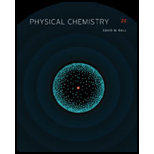
Concept explainers
Interpretation:
The values of
Concept introduction:
The
The
Answer to Problem 18.44E
The values of
Explanation of Solution
The expression for
Since the temperature
The expression for
Since the temperature
The expression for
Since the temperature
The expression for
Since the temperature
The values of
Want to see more full solutions like this?
Chapter 18 Solutions
Physical Chemistry
- The reaction of quicklime, CaO, with water produces slaked lime, Ca(OH)2, which is widely used in the construction industry to make mortar and plaster. The reaction of quicklime and water is highly exothermic: CaO(s)+H2O(l)Ca(OH)2(s)H=350kJmol1 (a) What is the enthalpy of reaction per gram of quicklime that reacts?. (b) How much heat, in kilojoules, is associated with the production of 1 ton of slaked lime?arrow_forwardConsider the Haber process: N2(g)+3H2(g)2NH3(g);H=91.8kJ The density of ammonia at 25C and 1.00 atm is 0.696 g/L. The density of nitrogen, N2, is 1.145 g/L, and the molar heat capacity is 29.12 J/(mol C). (a) How much heat is evolved in the production of 1.00 L of ammonia at 25C and 1.00 atm? (b) What percentage of this heat is required to heat the nitrogen required for this reaction (0.500 L) from 25C to 400C, the temperature at which the Haber process is run?arrow_forwardThe thermochemical equation for the burning of methane, the main component of natural gas, is CH4(g)+2O2(g)CO2(g)+2H2O(l)H=890kJ (a) Is this reaction endothermic or exothermic? (b) What quantities of reactants and products are assumed if H = 890 kJ? (c) What is the enthalpy change when 1.00 g methane burns in an excess of oxygen?arrow_forward
- Given: 2Cu2O(s) + O2(g) 4CuO(s)H = 288 kJ Cu2O(s) CuO(s) + CuO(s)H = 11kJ Calculate the standard enthalpy of formation (Ht) for CuO(s).arrow_forwardUsing the data in Appendix G, calculate the standard enthalpy change for each of the following reactions: (a) Si(s)+2F2(g)SiF4(g) (b) 2C(s)+2H2(g)+O2(g)CH3CO2H(l) (c) CH4(g)+N2(g)HCN(g)+NH3(g) ; (d) CS2(g)+3Cl2(g)CCl4(g)+S2Cl2(g)arrow_forwardWhen lightning strikes, the energy can force atmospheric nitrogen and oxygen to react to make NO: N2(g)+O2(g)2NO(g)H=+181.8kJ (a) Is this reaction endothermic or exothermic? (b) What quantities of reactants and products are assumed if H = +181.8 kJ? (c) What is the enthalpy change when 3.50 g nitrogen is reacted with excess O2(g)?arrow_forward
- The following reactions can be used to prepare samples of metals. Determine the enthalpy change under standard state conditions for each. (a) 2Ag2O(s)4Ag(s)+O2(g) (b) SnO(s)+CO(g)Sn(s)+CO2(g) (c) Cr2O3(s)+3H2(g)2Cr(s)+3H2O(l) (d) 2Al(s)+Fe2O3(s)Al2O(s)+2Fe(s)arrow_forwardConsider the reaction Fe2O3(s)+3H2(g)2Fe(s)+3H2O(g) a. Use Gf values in Appendix 4 to calculate G for this reaction. b. Is this reaction spontaneous under standard conditions at 298 K? c. The value of H for this reaction is 100. kJ. At what temperatures is this reaction spontaneous at standard conditions? Assume that H and S do not depend on temperature.arrow_forwardFor the reaction HgO(s)Hg(l)+12O2(g),H=+90.7kJ: a.What quantity of heat is required to produce 1 mole of mercury by this reaction? b.What quantity of heat is required to produce 1 mole of oxygen gas by this reaction? c.What quantity of heat would be released in the following reaction as written? 2Hg(l) + O2(g) 2HgO(s)arrow_forward
- How much heat is produced by burning 4.00 moles of acetylene under standard state conditions?arrow_forwardHow many kilojoules of heat will be released when exactly 1 mole of manganese, Mn, is burned to form Mn3O4(s) at standard state conditions?arrow_forwardWhen boron hydrides burn in air, the reactions are very exothermic (a) Write a balanced equation for the combustion of B5H9(g) in air to give B2O3(s) and H2O(g). (b) Calculate the enthalpy of combustion for B5H9(g) (fH = 73.2 kJ/mol), and compare it with the enthalpy of combustion of B2H6 (2038 kJ/mol). (The enthalpy of formation of B2O3(s) is 1271.9 kJ/mol.) (c) Compare the enthalpy of combustion of C2H6(g) with that of B2H6(g). Which transfers more energy as heat per gram?arrow_forward
 ChemistryChemistryISBN:9781305957404Author:Steven S. Zumdahl, Susan A. Zumdahl, Donald J. DeCostePublisher:Cengage Learning
ChemistryChemistryISBN:9781305957404Author:Steven S. Zumdahl, Susan A. Zumdahl, Donald J. DeCostePublisher:Cengage Learning
 World of ChemistryChemistryISBN:9780618562763Author:Steven S. ZumdahlPublisher:Houghton Mifflin College Div
World of ChemistryChemistryISBN:9780618562763Author:Steven S. ZumdahlPublisher:Houghton Mifflin College Div Chemistry by OpenStax (2015-05-04)ChemistryISBN:9781938168390Author:Klaus Theopold, Richard H Langley, Paul Flowers, William R. Robinson, Mark BlaserPublisher:OpenStax
Chemistry by OpenStax (2015-05-04)ChemistryISBN:9781938168390Author:Klaus Theopold, Richard H Langley, Paul Flowers, William R. Robinson, Mark BlaserPublisher:OpenStax Chemistry for Engineering StudentsChemistryISBN:9781337398909Author:Lawrence S. Brown, Tom HolmePublisher:Cengage Learning
Chemistry for Engineering StudentsChemistryISBN:9781337398909Author:Lawrence S. Brown, Tom HolmePublisher:Cengage Learning Chemistry: The Molecular ScienceChemistryISBN:9781285199047Author:John W. Moore, Conrad L. StanitskiPublisher:Cengage Learning
Chemistry: The Molecular ScienceChemistryISBN:9781285199047Author:John W. Moore, Conrad L. StanitskiPublisher:Cengage Learning





